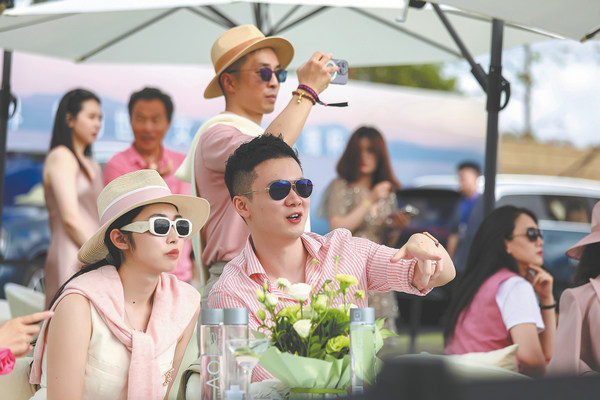

As a mixed-gender sport, polo has historically been dominated by male players, but women currently represent the fastest growing sector of the game, accounting for 40 percent of US Polo Association membership.
"It is the highest level of women's polo competition in China," says Luo Bin, a polo player herself and the co-founder of the club.
"I hope to take this opportunity to help Chinese players enhance their game, provide the public with a social experience around the sport, as well as make the world polo enthusiasts know about the rapid development of Chinese women's polo."
Founded in 2017 in Beijing with another polo lover, Jackie Wang, the club aims to revive the sport in China, especially among women and young people.
In China, paintings, murals, figurines and other images of polo can be traced as far back as the Tang Dynasty (618-907), with both male and female aristocrats depicted chasing the ball on horseback.
During the late Qing Dynasty (1644-1911), modern polo was introduced by expatriates who lived in cities, such as Shanghai, Beijing and Tianjin.
During the 1930s, it enjoyed a period of popularity in China and, in 1959, during the first-ever National Games, polo was included as an official sport.
"Situated in the high mountains with an average 1,750 meters above sea level, our club enjoys beautiful views and ideal weather for the sport," Luo says.
Partnering with Wulong district government, the club has a total area of more than 170,000 square meters. It boasted nearly 100 Argentine polo ponies imported from the South American country this year and a top venue that can host international events.
It also has stables, indoor horse training fields, sand polo fields, event polo fields, grazing areas and other business formats, as well as bars, a clubhouse and art exhibition halls.
Hou Tianbo, director of the development department of the Chinese Equestrian Association and deputy director of the Polo Professional Committee, says that this event, staged in a top tourist spot, is an innovative approach to attract general public to the sport.
"At present, sports have become an important part of many people's lives. While challenging the physical and spiritual limits of human beings, they are also constantly creating more possibilities for social progress and life," he says.
"Chinese polo development is still in an early stage and needs a lot of investment and promotion," he adds.
As polo requires significant investments on horses, training, equipment and facilities, it used to be out of reach of the general population. Now, thanks to the club founders, the Xiannyu Mountain club can offer affordable service packages to the people to experience the sport. For instance, a 45-minute polo coaching session costs 598 yuan ($83) for 6- to 17-year-old first timers.
As a famous summer retreat with an amiable climate, the Xiannyu Mountain area attracts thousands of people every year.